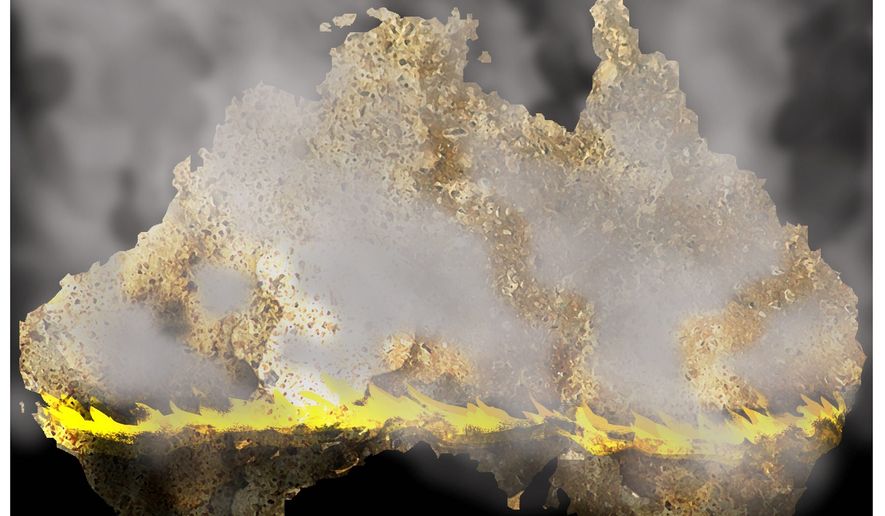OPINION:
Despite welcome respite from rain and hailstorms, nearly 100 bushfires remain in southeastern Australia. While hot and windy conditions to come have increased the risk of further fires, the temporary relief still offers an opportunity to assess what we’ve learned and, hopefully, end the partisan blame game that has marred this tragic chapter.
Since they started, politicians and celebrities alike have chipped in with statements on the fires’ origins and severity. Lack of action on climate change by Australia’s government, they insist, is the culprit. In retaliation, conservatives have resorted to partisan attacks. But if Australia is to prevent further loss of life and property in the future, both sides must be set straight.
For Aussies like me, seasonal fires are a reality of life, but this season has been particularly devastating. They’ve burned through 11 million hectares of land (an area almost the size of Virginia), which is a whopping 7,040 times larger than that claimed by the fires that devastated California in 2019. At least 29 people have died and thousands have lost their homes. An estimated 1.25 billion kangaroos, koalas and other creatures (as well as billions of insects) are feared to be lost to the flames.
But contrary to the criticisms of activists, none of this is because of Australia’s climate policy.
Even Australia’s Bureau of Meteorology has piled on, blaming climate change for lengthening fire seasons. Even so, we must understand that Australia only accounts for 1.3% of global greenhouse emissions. It also lacks the political leverage necessary to prompt a stronger response from the world’s biggest polluters, including the United States, which pulled out of the Paris Climate Agreement, or China and India, who effectively have free reign to set their own lenient targets under that deal. Even if Australia were entirely deindustrialized, the climate wouldn’t change. Experts further note that since global warming is an incredibly gradual process, its impact on aggravating bushfires is miniscule when compared to any other factors that have played a role.
Australia hasn’t avoided taking action. In fact, it’s on track to halve per capita emissions relative to 2005 levels by 2030 — one of the only Paris Agreement signatories to do so. Australia’s federal and state governments currently pour billions of taxpayer dollars a year into subsidies for wind and solar to foster climate abatement, even though these drive up power bills for families and businesses in the long run by pushing more reliable sources of generation into premature retirement.
Sure, Australia could do more to decarbonize its economy. Repealing its irrational prohibition on nuclear energy would be a great start. However, the notion that fires are worsening because Australians aren’t doing enough on climate just isn’t true.
On the other side of the aisle, conservatives have blamed green activists for worsening the fires through a historical opposition to controlled or “hazard reduction” burns and other measures to reduce fuel loads. Yet, it was a conservative government that passed laws making it illegal for Australians to collect dead wood from forests without a permit or to conduct burns in certain forest areas. Bureaucrats also fined farmers for conducting burns on their own property. Ironically, the Australian Greens officially endorse hazard reduction burns.
Controlled burns aren’t a perfect solution. Increasingly dry conditions mean there’s a limited window of time to conduct them safely. They also often raise valid concerns about endangered species and biodiversity loss in an already sensitive, precarious ecosystem.
But there are unambiguous takeaways and lessons that can’t afford to be lost in the partisan squabble. Since Nov. 8, at least 183 people have been charged with fire-related offenses, including at least 24 who are accused of deliberately setting bushfires.
Surely, government resources would be better put toward preventing potentially fatal mischief, instead of where they are now: The police’s heavy-handed pursuit of low-order victimless crimes like drug offenses. Is it important that they continue their substantial presence at music festivals, including strip-searching teenagers on mere suspicion of drug possession?
Climate change activists, like the “Extinction Rebellion” movement, whose ongoing protests amid the fires also divert these resources, should take heed as well. Embracing controlled burns and loosening the bureaucratic restrictions preventing them might be necessary, but places like Australia and California have always been fire-prone and always will be.
So, then, what’s the answer? Stronger penalties, arson monitoring, better early detection and targeting systems for fires would do much good. Better access to safety bunkers and other places of refuge for potential human and animal victims in the coming years would help, too.
But using disasters to point-score against political opponents with misleading and hypocritical claims to further pet causes doesn’t help. It only inflames poisonous divides when nations and communities should come together in the face of adversity. Australia doesn’t need more political theater from Greens and Nationals politicians throttling each other. It needs help.
• Satya Marar is a Australian writer and policy analyst with Reason Foundation now residing in Washington, D.C.




Please read our comment policy before commenting.